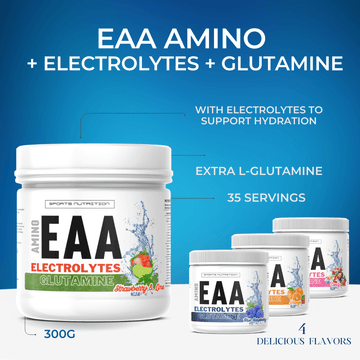Glutamine Amino Acid
What is Glutamine
Glutamine is an endogenous amino acid, so it can be synthesized by the body itself. However, this action is small-scale, and shortages may arise over time. The more important functions of this substance include being a precursor to the synthesis of protein and other amino acids and glucose. It supports the functioning of most systems and is responsible for the work of a large number of cellular processes.
L-Glutamine benefits:
Glutamine works comprehensively and supports the work of the whole body in many areas. The basic activity of the amino acid is participation in nitrogen metabolism. This is one of the reasons why glutamine is absolutely necessary for the proper functioning of the body. It supports the immune system and is especially useful for white blood cells. It is thanks to them that we can enjoy better health and faster recovery.
L-glutamine is a desirable ingredient in protein synthesis. It is the precursor of the whole process, which is why it is of particular interest among athletes. It can be used as a dietary supplement to support muscle development and speed up recovery after training. In some cases, additional strengthening of the body with glutamine helps to reduce pain after exercise.
Glutamine for Gut Health
The immune system benefits of glutamine are related to its role in gut health. In the human body, the intestines are considered the largest component of the immune system. This is because a large proportion of the cells in the gut are responsible for the production of immunoglobulins. Glutamine is an important source of energy for gut and immune cells. It also helps to maintain a barrier between the bowels of the gut and the rest of the body, thus protecting against a leaky gut. This prevents harmful bacteria or toxins from the gut from entering the rest of the body. In addition, it is important for the proper growth and maintenance of cells in the intestine. Due to the important role of the gut in the immune system, glutamine can benefit overall immune health by supporting gut cells.
L-Glutamine - who should use?
The positive effects of glutamine will be noticeable by athletes. Its effect on reducing cortisol improves the quality of training and helps to achieve better results. In addition, many people emphasize that after taking the amino acid, the rest after exercise is shorter and the pain is much less noticeable.
People who want to support the work of their body can also reach for glutamine. The amino acid works comprehensively and improves the functioning of many organs. Improvement is seen in areas such as the immune system and the intestines. It supports recovery, both after training and in the event of damage to health, and reduces the time of infection. It also speeds up the healing of wounds, especially burns.
When to take l-glutamine?
The use of glutamine as a supplement should be carefully thought out, analyzed and adjusted. It is this type of preparation, the intake of which can be gradually increased, but you should start with a smaller and safer dose. What does it mean? A person who is just starting supplementation should not take too high doses.
Naturally, you can start by changing your diet, i.e. introducing high-protein products that are rich in natural glutamine. However, it may turn out that this type of supply and processing (because in this situation processing is necessary) do not fully meet the demand for glutamine and its deficiencies still appear . and easily accessible to the body , which means that it can make use of it immediately.
The use of glutamine should also depend on physical activity and the purpose for which it is taken. In some circumstances (building muscle mass) it should be taken on an empty stomach and after training (2-3 daily doses). In other circumstances (reduction) can be taken both before and after exercise.
Glutamine dosage
The dosage of glutamine is very much related to the way it is taken and used. As already mentioned, a person new to taking this supplement should start with small doses. Only over time, it can gradually increase. And so, in the first period of taking the maximum daily dose should not exceed 10 g, which are additionally broken down into two or three portions. Such a gradual introduction of the amino acid into the body allows for its full use and utilization, and this, in turn, results in a much better processing.
In the case of people who have been taking glutamine for some time, they can increase its dose up to 40 g per day. However, it must be remembered to divide it into equal portions, but one such portion cannot exceed 10 g .



































